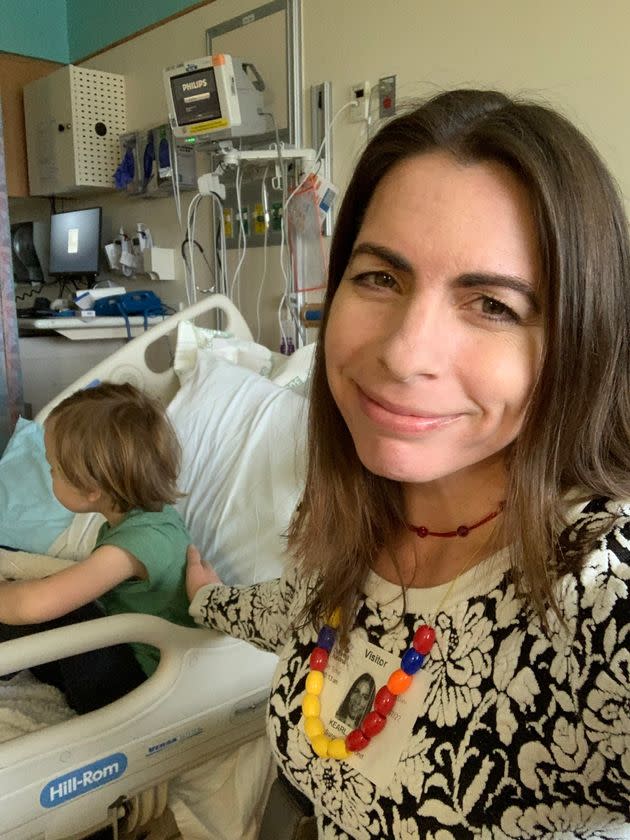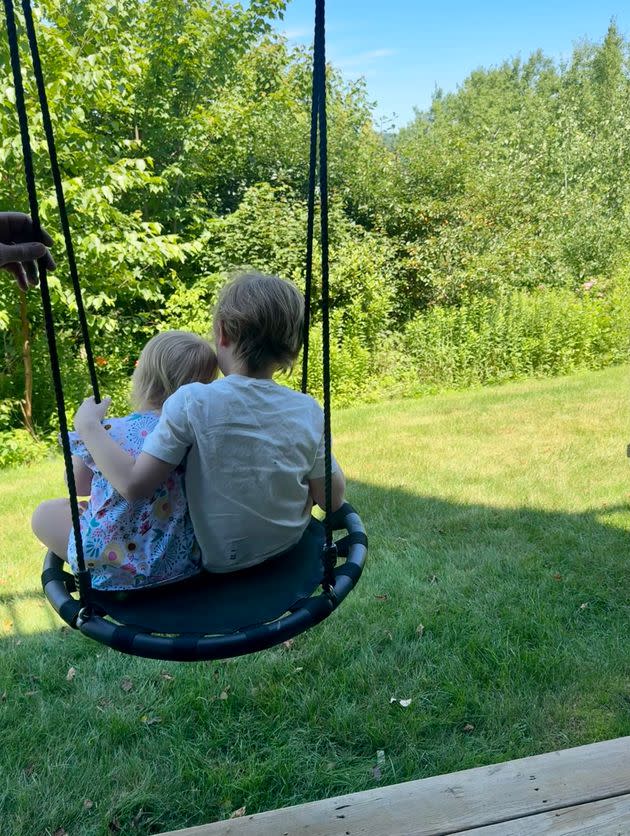As A Mom To A Son With Rare Diseases, Here’s What I Think About Trump’s Alleged Comments About People With Disabilities

- Oops!Something went wrong.Please try again later.
- Oops!Something went wrong.Please try again later.
Donald Trump’s nephew Fred Trump III alleges in a new book, excerpted for Time magazine, that in a private conversation about people with disabilities who require expensive care, his uncle said, “Maybe those kinds of people should just die.”
Donald Trump allegedly made a similar statement when discussing Fred Trump III’s own son, who has a KCNQ2 gene mutation that resulted in intellectual and developmental disabilities. The nephew writes that he was appalled by his uncle’s remarks and the implication that there is a whole group of people whose lives don’t matter. If it’s true that Donald Trump made these statements, I am appalled as well — partly because my 6-year-old son is one of those people.
When I read the Time article, I was sitting in a hospital room in Washington, D.C., where I was helping my son recover from an expensive and scary health situation. After a scheduled major surgery, he kept having fevers and pain during his expected recovery days at the hospital. My spouse, Mark, and I were very worried. Like other parents, we want our child to be well.
We kept speaking up about his pain, and after various diagnostics, members of the medical team determined that my son had a postsurgery leak into his stomach that could have led to life-threatening sepsis. They created a treatment plan, and thankfully he is nearing the end of his recovery at the hospital. I am so relieved he will be OK.
Worrying about his health is not new to me, however. My son has five health conditions, and four of them are considered rare, because they affect fewer than 200,000 Americans. With rare conditions, the necessary specialists, treatment plans and unexpected complications can be very expensive. My son is tracked by three specialists, and he’s already had nine major surgeries. This past year, he had three unplanned hospital admissions for other issues, a few emergency room visits, and several medical appointments.
His daily care costs money, too. He requires catheters to empty his bladder every few hours, an ostomy bag for his stool, and daily medications. One of his five medicines alone would cost around $1,300 a month without insurance. We are so lucky to have good health insurance that covers most costs. Even if we didn’t, caregivers like me and like Fred Trump III and his wife would not just let our children die. We do everything we can to help them live as long as possible, including adapting our lives to better care for them.
For me, this means being on call most of the time to help my son, including overnight when I co-sleep with him. Even when he’s at school, Mark and I are always ready to drive over at a moment’s notice for an emergency, and we take turns doing his midday medical care. Before he was born, I used to travel the world for work, but now I never want to travel away from him.
This level of caregiving can be exhausting, stressful and discouraging at times, especially when there are setbacks or crises. Mark and I are lucky to have remote work schedules and the support of each of our parents, and friends, neighbors and relatives as we care for him.
We also feel incredibly lucky to have him.
He has been the light of our lives since the moment he was born. He began smiling when he was only a few days old. He gives me, Mark and his 1-year-old sister many hugs across the day and tells us he loves us. His favorite person is his sister, and he will run to her side whenever she is upset. He plays flashlight tag with her and me before bedtime, prepares her toothbrush and sings “Blackbird” if she cries at night.

He’s a good friend who is playful and empathetic. If he sees that anyone is sad, he will talk to them and say things like “Everyone has bad days sometimes. I do too, and it will be OK.”
At the end of kindergarten, I was present when the 20 other children in his class said their favorite part of the year. Multiple kids said that he was their favorite part; no other child was named in this way. Meanwhile, he said that “my favorite part was my friends.”
A few days ago, when he heard that one of our neighbors lost a family member, he made her a sticker book page from his hospital bed to let her know he cares. He joins me in volunteering monthly to deliver food to older adults who are homebound, and a few times a year, we make care baskets for babies in the NICU who were born with one of his conditions.
He enjoys telling jokes and putting together puzzles, Lego sets, and sticker book designs. He plays soccer, ice-skates, swims, scooters, and plays arcade games. He plays Floor Is Lava and dances with his sister to our family playlist. He brings our house to life. Because of him, I never take the good moments, the healthy days, or our times with friends and family for granted.
My dismay over Donald Trump’s cruel alleged comments also stems from my childhood. My older sisterwas born with microcephaly, which resulted in cerebral palsy-like symptoms. She could not walk, talk or hear, and she had a feeding tube as she could not swallow.
She had a few expensive major surgeries to improve her quality of life. Thanks to the determination of our parents, especially our mom, she learned to drive an electric wheelchair and she could swim independently with an inner tube. She liked when I splashed her in the pool and swam alongside her. Because she liked to see things fall, I built towers from moving boxes and wooden blocks for her to knock over. She’d give a breathy, slow laugh and raise her hand with glee. At night, she enjoyed the light shows I put on for her with glow sticks or by flipping the light switch. She’d laugh and smile from her daybed.
She loved people-watching and making friends. Whenever someone came over to say hi, she would reward them with a smile and a slow wave. She touched many people’s lives.
She died when she was 12 from complications related to her disabilities. I was 10, and it was the worst day of my life. It’s been 31 years and there’s not a day that goes by that I don’t wish I could kiss her hand and sign, “I love you.” When I am with my parents and younger sister, I still feel like our family is incomplete without her.
If Donald Trump said what his nephew alleges, her intellectual disabilities mean she is probably the type of person he was envisioning, even more so than my son. Her life mattered, though, and it wasn’t any less valuable than mine or Trump’s. The same is true of anyone with disabilities.
Losing my sister makes me more fearful of losing my son. But in stark contrast to what Trump allegedly said, I will continue to fight to keep him alive, just as most other caregivers in my position do. And just like all the medical folks who dedicate their lives to helping people with “expensive” disabilities do.
To take care of our children and other loved ones as best we can, caregivers need the support of politicians, policymakers and presidents who understand that their lives matter.
Do you have a compelling personal story you’d like to see published on HuffPost? Find out what we’re looking for here and send us a pitch at pitch@huffpost.com.
